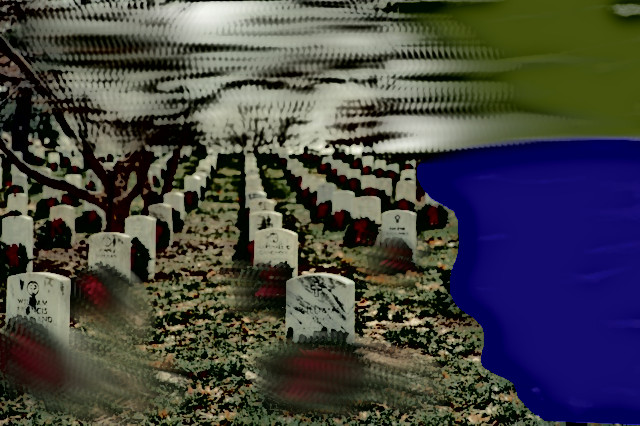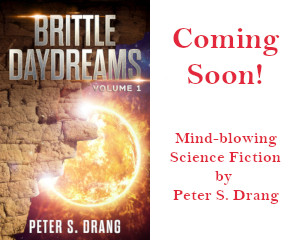“My Lakeside Graveyard”, (Horror, about 1,000 words) one of my flash stories, dropped today on the pro flash story site Flash Fiction Online. In this article I provide story notes on this macabre tale of loneliness and Karma.
WARNING: There are spoilers in this article, so before reading it please take the five or so minutes required to read this one thousand word story: Click Here to read “My Lakeside Graveyard” on the FFO website.
Story Origins
The idea for this story came from tales related to me by my late father-in-law. He came to the USA from Europe after World War II. He told me that some graveyard operators in Romania would wait to see whether or not relatives came to visit each grave. If a few years went by with no visitors, they would dig up the coffin and bury it deeper, then resell the plot. In some cases a prime plot may have had several coffins buried one on top of the next. When they ran out of room, they turned them vertically to fit even more “customers” in each spot.
This practice is of course illegal these days, but amazingly a case appears to have turned up just recently in New York State of a modern graveyard operator doing the same thing: allegedly burying multiple coffins in the same plot!
Theme
The theme of this story is loneliness. I like to establish my theme early, and this story is no exception. In the opening hundred words we find that the main character is alone running his family graveyard, as his last relative–his mother–has recently passed away. We find that he learned unsavory business practices from his long-deceased father, and he resells plots in a similar way to that described by my father-in-law’s stories. However, rather than burying multiple coffins in a single plot, the main character dumps coffins in the lake (weighed down by the occupant’s headstone).
The way he chooses which plots to recycle also illustrates the theme: when mourners stop coming, the plot is resold. Thus, the deceased who are disinterred can also be seen as lonely, having no visitors. This parallel: the main character’s loneliness and the deceased people’s loneliness, comes full circle in the ending.
The fourfold repetition of the line “No mourners, you get the lake” is also important to the story’s structure and drives home the theme. The first time this line is introduced, the main character is quoting his father. The second and third times, he says it himself to Elenore, showing that the sins of the father have now firmly transferred to the son. The final time, it is Elenore using it against him in judgement, completing the thematic circle. Repetitive lines like this, if used judiciously, can serve as an anchor for a story. Having the final instance be the very last line of the story is also important: it allows the story to end on a resonant “aha” feeling for the reader.
Speculative Element and Mood
The opening to the story has creepy aspects to set the mood, but the speculative element appears a bit later than usual for my writing. I think it’s okay in this case because there’s enough weird stuff going on that the reader will recognize something supernatural is probably on the way.
We get little dribs and drabs of information that something’s not quite right about this lake, for example. The dead lovers and their poem, the official name of the lake that the main character tries to hide from prospective customers, and of course the morally bankrupt business model the main character has adopted all clue in the reader that something dreadful is going to happen to him.
Another clue is this short paragraph:
Serenity Lake is small but deep. That’s good. Always room for one more. Always.
Reviewers have told me that that sequence, with the repetition of “Always” made them feel dread, as it subtly implies he’s going to be the “one more” by the end. An implied threat can be more powerful than an explicit threat.
When the main character starts talking to dead Elenore Heckerson it’s fairly clear (at least at first) that it’s just a little game he’s playing in his own head, due to his intense loneliness. He comes up with many different excuses for the weird things that happen, such as believing that the scratching sound coming from the coffin is a wayward rat, or that the gaze of the corpse follows him due to the headstone shifting the body, or the bubbles coming from the lake are “swamp gas”. When the lake starts to actually boil, though, there is no longer any doubt that there’s a supernatural element. By the last line of the story, it becomes clear that Elenore really is communicating with the main character, and she delivers her final judgement on him.
Arc
There’s not a dramatic arc in this story, but there is a whisp of one, and for flash fiction that’s sometimes all you can squeeze out of the format.
There’s a clear turning point in the story. Right after digging up the coffin, the main character considers putting it back in the ground.
I think long and hard. I could slide her back into the hole easy enough.
He has a chance to avoid his fate. That’s actually very important in a short story: make sure there’s a reasonably clear “point of no return”. This segment shows that the character really does understand what he’s doing is wrong regardless of all the excuses he tells himself (and thus he deserves his fate). Unfortunately, he doesn’t take this final chance at redemption and convinces himself that there’s nothing wrong with what he’s doing.
But plots are getting scarce …
At the very end, the main character, as he’s drowning, is informed by Elenore that he has no mourners since his mom died, and so that’s why he’s “getting the lake”. Karma in action. Too late, he realizes he’s not so different from the lonely deceased, and now he’ll join them.
Little Details
Little details can help flesh out a story, even if most readers don’t notice them. I’m a firm believer that things do sink in at a subconscious level and help support a story.
For example, I chose the woman’s name, “Elenore Heckerson”, very carefully. Elenore harkens to Poe’s tragic “Lenore” from the “The Raven” (and also Elenore Rigby, the titular character from the Beetle’s well known song about “all the lonely people”). Heckerson starts with HECK, an oblique reference to hell. Although most readers may not explicitly notice these things, these details may still plant a subconscious element of dread, supporting the mood.
The inscription on Elenore’s headstone is also one of these little details: “Elenore Heckerson, Beloved Daughter”. Notice that it doesn’t say “Wife” or “Mother”. From this the reader can infer that the reason nobody has visited her in over 20 years is that she never married or had children, thus after her parents, aunts, uncles, etc. died, nobody was left who was motivated enough to visit her.
The most important little detail is that the main character’s mother died very recently. In the original draft of the story, before I had the line “no mourners, you get the lake”, the mother had died long before the story started. But one reviewer commented “Why is the ghostly revenge happening now? He’s been digging up graves for years.” From that comment I realized I had an opportunity to enhance the loneliness theme by making his mom recently deceased. The lake ghosts didn’t take revenge in the past because his mom died only recently. If they had killed him earlier, he would have had one mourner, his mom. Only after she died would he have no mourners, and by his own words deserve “the lake”. I made sure to mention that Elenore was the very first updig after his mom’s death.
Timeline
Here’s the full publication timeline for this story.
- Draft started 10/1/2020
- Submitted to OWW workshop 10/5/2020
- Revised several times over the following week based on comments from 5 reviewers
- Submitted to Flash Fiction Online 10/13/2020
- My workshop editors selected the story as a featured “editor’s choice” story for the month of October, 2020.
- Received Revision Request from FFO 11/25/2020
- Submitted Revised story (minor revisions) 12/2/2020
- Revisions accepted by FFO 12/9/2020
- Contract fully executed 1/24/2021
- Published online 5/21/2021
Total calendar time: just under four months from started first draft to contract, then about another four months to publication. This was reasonably fast turn-around due to the story being bought by the first publication I sent it to.
Total actual writing time was around 4 to 5 hours including all edits and the revision requested by the publisher.
Conclusion
This story is a good example of taking an anecdote you hear from a friend or relative and turning it into a story. When creating the story, I changed many details of the original anecdote to make it work better (for example, I had the deceased bodies thrown into a lake instead of being buried deeper, the lake made for a more visual element). The lack of visitors was the key to determining that the correct theme would be “loneliness” and so the main character would also have to be a lonely person.
In any case, the lesson here is: don’t feel the need to follow the original inspiration exactly. You’re writing fiction, not a documentary.
What does the story mean to you? Leave a comment and let me know.
See also: “Gator and the Big Buzz” Accepted by FFO
See also: Turning Everyday Life into Science Fiction Story Ideas



